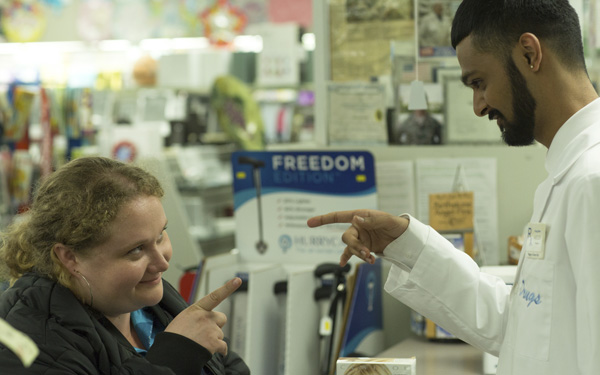This infectious first feature by director Geremy Jasper showcases a lot of newcomers, which makes the whole package a fresh experience. Australian actress Danielle MacDonald stars as Patricia Dombrowski, a plus-sized 20-something who literally cannot stop dreaming of making it as a hip-hop star. (Besides wistfully staring out toward the New York City skyline, she literally floats on air, absorbed by the music playing on her headphones.) If only she had any idea how to make it out of her dead-end, blue-collar New Jersey town.
Patti and her mother, Barb (Bridgett Everett), live with grandmother (Cathy Moriarty, almost unrecognizable), who is in declining health. Nana’s medical bills are piling up, and the family is barely scraping by on Barb’s income as a hairdresser and Patti’s as a dive bar bartender. It’s a desolate existence. Especially since Barb spends her share of the household income on alcohol.
Everett’s turn as Barb is definitely one of the highlights of the film. A woman in her 50s, she was once the lead vocalist in a local hair band that nearly had a record deal. Now she is coasting by on her past reputation as a “piece of A,” spending her nights at the bar where Patti works part-time, performing karaoke and trying to land a man who’ll take care of her and Patti for a little while.
Patti’s dream, to get herself out of squalor, hasn’t quite become a rational plan; it’s still very much in the dream world. Even though she is quite gifted at freestyle rapping, her talent is not put to practice as much as she keeps fantasizing about seeing herself already at the finish line, being introduced to the stage by her favorite rapper, O-Z (Sahr Ngaujah).
The only person who evens know about her dream is her best friend, Jheri (Siddharth Dhananjay). In a spirited performance, Dhananjay’s Jheri works in a pharmacy, but as soon as closing time rolls around, he is out of his smock and donning the hip-hop clothing of his alter-ego, “Jheromeo.” He and Patti, aka “Killa P,” cruise endlessly around in Patti’s car listening to their favorite radio show, hosted by DJ French Tips (played by none other than 1980s–’90s rapper MC Lyte). Together the twosome collaborate on spitting their own rhymes. Patti has obvious skill, but she’s too bashful to break out and perform in front of an audience.
While the film’s focus is on Patti, Jheri is the real hero of the film. He is that special best friend who sees her talent, but he knows that she’s not going to go for it unless someone gives her the nudge she needs. So he gets shows booked, even if they are at strip clubs performing in front of practically no one. He also puts his own money down for a session in a recording studio. Heck, he’s the one who pushes her into her first freestyle battle against the boy she has a crush on, Danny (McCaul Lombardi), where it quickly turns heated, with Danny calling her, among other things, the “white Precious.” Needless to say, the crush is not mutual.
After she meets Basterd, an anarchist who performs thrash metal music and who also owns recording equipment, the plot starts to come together musically. Basterd (played creepily by a stoic Mamoudou Athie) lives in a hut in the middle of the woods that also happens to be decorated with skeletons and other serial killer calling cards, where he, Patti, and Jheri come together and form a band. Oh, and don’t forget Nana, who Patti wheels into the hut to add her unique, cigarette-stained vocals to an improvised track.
Of course we’ve seen this kind of thing before in films, like in Hustle & Flow and Straight Outta Compton (except for the music, the setting and plot is straight out of a 1930s Warner Brothers backstage musical). But director/screenwriter/song composer Jasper’s take on the outsider breaking into the recording industry succeeds because of just how far removed Patti and company are. No one, not even Patti’s own mother, wants her to succeed, and that’s the kind of oppression anyone trying to become an artist in an impoverished area has to face.
But probably what makes Patti Cake$ especially delightful is that it maintains a constant level of humor and dares to be unabashedly sentimental, even when there are ample opportunities for Jasper to push the story into much darker territory. There are even moments when it, thankfully, is fearless enough to steer right into cheesy territory, like at the showstopping climax, and still remains credible.







Leave A Comment